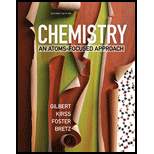
To:
Calculate the
Answer to Problem 22.59QA
Solution:
Explanation of Solution
1) Concept:
We are asked to find the pH of a solution of selenocysteine, which is a diprotic acid with two
2) Formula:
i)
ii)
3) Given:
i)
ii)
iii)
4) Calculations:
RICE table for selenocysteine
| Reaction | ||||
| [ |
[ |
|||
| Initial | ||||
| Change | ||||
| Equilibrium | ||||
Equilibrium constant expression for above reaction is
This equation fits the general form of a quadratic equation. Solving this equation to get values of x as
We will use the positive value of
We would use these equilibrium concentrations for
RICE table for selenocysteine [HA] for second dissociation:
| Reaction | ||||
| [ |
[ |
|||
| Initial | ||||
| Change | ||||
| Equilibrium | ||||
Equilibrium constant expression for the second dissociation for selenocysteine is
Solving this quadratic equation to get two roots as
We will consider only the positive value of
Thus,
Calculating pH using the formula
Conclusion:
For a diprotic acid, we need to consider the dissociation of two protons to find the pH of solution.
Want to see more full solutions like this?
Chapter 22 Solutions
Chemistry: An Atoms-Focused Approach (Second Edition)
 ChemistryChemistryISBN:9781305957404Author:Steven S. Zumdahl, Susan A. Zumdahl, Donald J. DeCostePublisher:Cengage Learning
ChemistryChemistryISBN:9781305957404Author:Steven S. Zumdahl, Susan A. Zumdahl, Donald J. DeCostePublisher:Cengage Learning ChemistryChemistryISBN:9781259911156Author:Raymond Chang Dr., Jason Overby ProfessorPublisher:McGraw-Hill Education
ChemistryChemistryISBN:9781259911156Author:Raymond Chang Dr., Jason Overby ProfessorPublisher:McGraw-Hill Education Principles of Instrumental AnalysisChemistryISBN:9781305577213Author:Douglas A. Skoog, F. James Holler, Stanley R. CrouchPublisher:Cengage Learning
Principles of Instrumental AnalysisChemistryISBN:9781305577213Author:Douglas A. Skoog, F. James Holler, Stanley R. CrouchPublisher:Cengage Learning Organic ChemistryChemistryISBN:9780078021558Author:Janice Gorzynski Smith Dr.Publisher:McGraw-Hill Education
Organic ChemistryChemistryISBN:9780078021558Author:Janice Gorzynski Smith Dr.Publisher:McGraw-Hill Education Chemistry: Principles and ReactionsChemistryISBN:9781305079373Author:William L. Masterton, Cecile N. HurleyPublisher:Cengage Learning
Chemistry: Principles and ReactionsChemistryISBN:9781305079373Author:William L. Masterton, Cecile N. HurleyPublisher:Cengage Learning Elementary Principles of Chemical Processes, Bind...ChemistryISBN:9781118431221Author:Richard M. Felder, Ronald W. Rousseau, Lisa G. BullardPublisher:WILEY
Elementary Principles of Chemical Processes, Bind...ChemistryISBN:9781118431221Author:Richard M. Felder, Ronald W. Rousseau, Lisa G. BullardPublisher:WILEY





